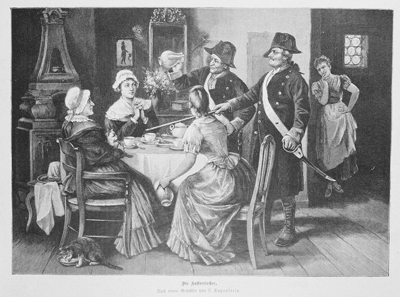Kaffeesteuer in Germany

Coffee tax (Kaffeesteuer in German) is a German excise duty that is collected by the customs. It is mandatory to pay tax on coffee for all of Germany except for Büsingen and the Island of Helgoland. Coffee tax has to be paid for every type of coffee (it does not matter if it are coffeebeans, coffeepads, ground coffee etc.) and for products that contain coffee like chocolate with coffee in it.
The coffee tax for roasted coffee is 2,19 € per kilogram excl. VAT (2,34 € incl. VAT) and for instant coffee 4,78 € excl. VAT per kilogram (5,11 € incl. VAT).
On several occasions questions have been raised by members of the European Parliament as it is difficult to administer the coffee tax (deposits, final account for the customer etc). The European commission has called on Germany to remove restrictions on import of coffee as it is against free movement of goods within the European union. However Germany makes more than 1.000.000.000 € per year from the coffee tax. So it is very likely that they won’t give up on it very soon.
Kaffeesteuer at Café du Jour
We sell and ship coffee from the Netherlands, the following applies when you order at Café du Jour:
- If you are a private customer, we will pay the coffee tax for you at the Hauptzollamt Saarbrücken. In the checkout you can see what amount of your order will be paid as coffee tax. You don't have to do anything yourself.
- If you are a business customer, the reverse charge rule applies. According to § 17 Kaffeesteuergesetz, as a business customer you are responsible for paying the Kaffeesteuer when you import coffee from another EU member state into Germany. We will charge no VAT and Kaffeesteuer on your order as it is your responsibility as a business to pay the taxes yourself. If you enter a valid German VAT number during checkout, the tax will automatically be deducted from your order.
- If you buy green beans (unroasted coffee), coffee tax is not applicable.
History of coffee tax in Germany
Already in the 19th century, a levy on coffee was an important source of income for the German state. When Germany was in ruins after the Second World War, the coffee tax was a way of providing additional income for the recovering state. When the D-mark was introduced in 1948, the tax for a kilo of roasted coffee (Röstkaffee) was 10 marks. As Germany's neighboring countries did not have a similar tax on coffee, large price differences emerged.

For the impoverished German population in the border region, coffee soon became a way to earn some extra money. After the war, you could buy a kilo of coffee for 8 marks in Belgium, which could be sold just across the border in Germany for double. Coffee became a smuggling commodity. In post-war Germany, the trade in coffee was more lucrative than the trade in cigarettes. Smugglers hid the coffee in hearses, in petrol tanks or in car tyres.
The smuggling gangs became increasingly violent. At one point, smugglers even used tanks stolen from the Belgian army. Between 1946 and 1952, 31 smugglers and two customs officers were shot. Smugglers crossed the border especially in the area of Aachen and the Eifel. Between 1946 and 1950, the customs authorities in Aachen alone seized 223,601 kg of coffee. The German media dubbed the border region the 'Aachener Kaffeefront'.
The violence of smuggling finally forced the young Federal Republic to make a tax change. In 1953, Germany reduced the coffee tax to 4 marks per kilo. Coffee smuggling was no longer profitable. But this did not end the extraordinary history of the coffee tax in Germany.
Even now, Germans still come to the Netherlands to stock up on coffee. Petrol stations on the Dutch-German border are often packed with coffee. Sometimes owners of petrol stations earn more from this than from the sale of fuel, because many Dutch people go to Germany for that. Stocking up on coffee in large quantities in order to make money on the other side of the border is not the intention. Germans are allowed to take home a maximum of ten kilos per person in case they transport the coffee themselves.












